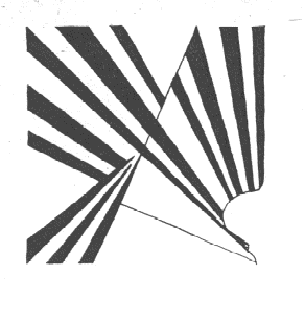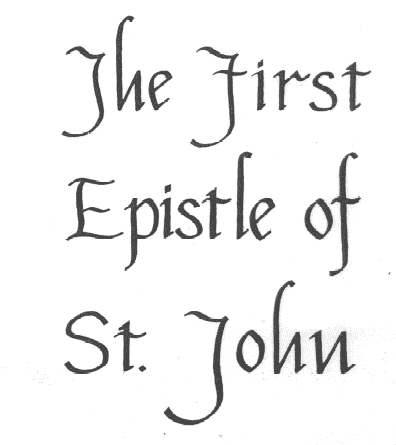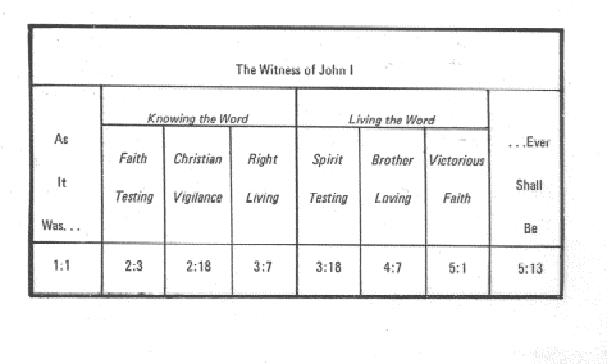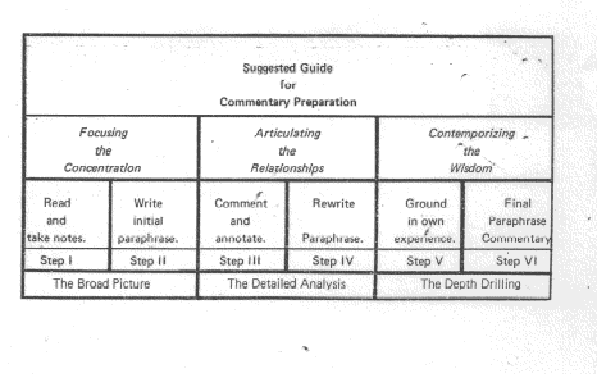


| ||

| ||
| The First Epistle of John Summer '73
INTRODUCTION TO THE SOLITARY JOURNAL |
Whenever there has been resurgence in the life of the Church it has been accompanied by and accomplished through a new appropriation of the Scriptures. Augustine, Luther, Wesley, and Bonhoeffer wrestled through the Biblical poetry until they had a new grasp of the truth about their own lives, and with passionate urgency they wrote commentaries so that others might grasp that possibility of life for themselves. Lives were changed; thus, the course of history was altered.
As a dynamic of the Research Assembly, we will be seeking a fresh articulation of the message of the First Epistle of John. Each individual will be working to discover the unique significance of John's witness as it illuminates his own journey and given situation. For we of the Church today are struggling with many of the same issues with which he wrestled in his time.
It is not intended that the Assembly reach a common interpretation of the Epistle, but rather that each person bring to this work his own insights and experiences. In this way, the Epistle will become a way of articulating one's own life journey.
As you work, you may find it helpful to use the following procedures:
Annotation. While reading through the text, note the words ar,d phrases that stand out either bY their clarity or by the fact that they do not seem to communicate any life experience. Tell how and why you would amplify them or substitute other words. These are notes to yourself about the words and the relationships that illuminate their meaning. Reflect also on the audience and the issues that the author is addressing. Paraphrase. Rewrite in your own words the text of the scripture. You may want to do this more than once. Example: 1:8 "If we claim to be sinless, we are selfdeceived and strangers to the truth." Paraphrase: "If we see ourselves as perfect or having the possibility of being such by our own efforts, we are fooling ourselves and living in a selfcreated illusion which does not square with the way life comes to
us."
Commentary. This is to be your comments on the inner meaning of the passage as revealed through your lifeexperience. This is the place to relate the meaning of the passage to specific personal and sociological issues that you deal with from day to day. Example: 1:8 "Every man experiences his life as being broken: i.e., weak and filled with failure yet he tries to tell himself other stories that deny this fact. These stories continually collapse, thus he experiences impotence and despair over life itself. Oh, if only local man could hear the word of acceptance. Use me, O Lord, in this only task worth doing."
Your brooding and writing on the First Epistle of John is a solitary exercise. Writings will be read the following morning at breakfast. |
 |
 |
| Solitary Journal Summer 73
Text for Paraphrase New English Bible The First Epistle of John |
I John 1:1 2 :2
I. It was there from the beginning; we have heard it; we have seen it with our 1 own eyes; we looked upon it, and felt it with our own hands; and it is of this we tell. Our theme is the word of life. This life was made visible; we have seen it and bear our testimony; we here declare to you the eternal life which dwelt with the Father and was made visible to us. What we have seen and heard we declare to you, so that you and we together may share in a common life, that life which we share with the Father and his Son Jesus Christ. And we write this in order that the joy of us all may be complete.
II. Here is the message we heard from him and pass on to you: that God is s light, and in him there is no darkness at all. If we claim to be sharing in his life while we walk in the dark, our words and our lives are a lie; but if we walk in the light as he himself is in the light, then we share together a common life, and we are being cleansed from every sin by the blood of Jesus his Son.
III. If we claim to be sinless, we are selfdeceived and strangers to the truth. If we confess our sins. he is just, and may be trusted to forgive our sins and cleanse us from every kind of wrong; but if we say we have committed no sin, we make him out to be a liar, and then his word has no place in us.
IV. My children, in writing thus to you my purpose is that you should not commit sin. But should anyone commit a sin, we have one to plead our cause with the Father, Jesus Christ, and he is just. He is himself the remedy for the defilement 2 of our sins, not our sins only but the sins of all the world. |
| NOTES AND ANNOTATION: |
| Solitary Journal Summer 73
Text for Paraphrase New English Bible The First Epistle of John |
1 John 2:3 2:17
V. Here is the test by which we can make sure that we know him: do we keep his commands? The man who says, 'I know him', while he disobeys his commands, is a liar and a stranger to the truth; but in the man who is obedient to his word, the divine love has indeed come to perfection.
VI. Here is the test by which we can make sure that we are in him: whoever claims to be dwelling in him, binds himself to live as Christ himself lived. Dear friends, I give you no new command. It is the old command which you always had before you; the old command is the message which you heard at the beginning. And yet again it is a new command that I am giving younew in the sense that the darkness is passing and the real light already shines. Christ has made this true, and it is true in your own experience.
VIII. A man may say, 'I am in the light'; but if he hates his brother, he is still in g the dark. Only the man who loves his brother dwells in light: there is nothing to make him stumble. But one who hates his brother is in darkness; he walks in the dark and has no idea where he is going, because the darkness has made him blind. VIII. I write to you, my children, because your sins have been forgiven for his sake. I write to you, fathers, because you know him who is and has been from the beginning.
I write to you, young men, because you have mastered the evil one. To you, children, I have written because you know the Father. To you, fathers, I have written because you know him who is and has been from the beginning. To you, young men, I have written because you are strong; God's word remains in you, and you
have mastered the evil one. |
PARAPHRASE |
INITIAL COMMENTARY |
FINAL COMMENTARY |
This is not the entire document. If you are interested
contact ICA CentrePointeS